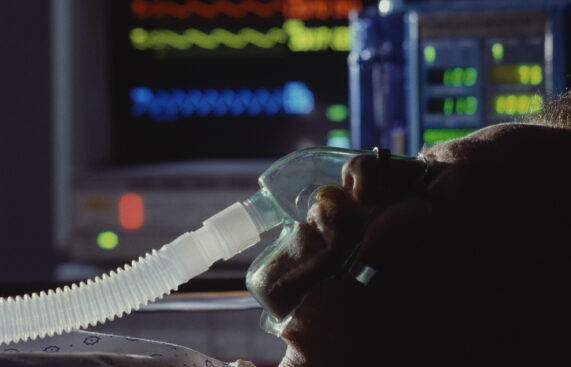Lancet Published online 1 May, 2021 | https://www.thelancet.com/journals/lancet/article/PIIS0140-6736(21)00676-0/fulltext
Digest author: Stylianos Loukides, ERS E-Learning Director / 9 May, 2021
The findings of the large, randomized RECOVERY study published in the prestigious journal ‘’The Lancet’’. Tocilizumab is a monoclonal antibody to interleukin-6, a cytokine that plays an important role in inflammation (eg in chronic inflammatory diseases such as rheumatoid arthritis) but also in the hyperinflammatory reaction seen in COVID-19 infection.
Since mid-2020, eight randomized, controlled clinical trials of tocilizumab for COVID-19 treatment have been reported. These include seven small trials (with less than 100 deaths each) and the slightly larger REMAP-CAP trial, which included patients with severe COVID-19, 99% of whom required non-invasive respiratory support or invasive mechanical ventilation. Overall, previous clinical trials had shown no significant benefit in reducing mortality with the addition of tocilizumab to the standard treatment (relative risk to mortality ratio was 0.89, with a 95% confidence interval of 0.72-1.11). However, the RECOVERY clinical trial included a significantly larger number of patients (approximately four times as many) as all previous trials.
The RECOVERY multilevel clinical trial is the largest randomized trial of the efficacy of tocilizumab in COVID-19 patients. Between 23 April 2020 and 24 January 2021, 4,116 were recruited. 3,385 (82%) patients were also received systemic corticosteroids. Patients with COVID-19 infection with hypoxia and elevated levels of C-reactive protein (ie with CRP levels ≥75 mg / L) were included in the above clinical study. Patients were randomly assigned to either standard therapy (n = 2094) or standard therapy with the addition of tocilizumab (n = 2022) at a dose of 400 mg – 800 mg (depending on weight). A second dose of tocilizumab could be given 12-24 hours later if the patient’s condition had not improved.
The mean age of the patients in the study was 63.5 years and the mean CRP was 143 mg / L. At randomization, 562 (14%) patients received invasive mechanical, 1686 (41%) received non-invasive mechanical ventilation (including high oxygen flow through nasal cannula or non-invasive continuous positive pressure ventilation) while 1868 (45%) did not receive supplemental oxygen by conventional means. The primary endpoint of the study was mortality regardless of cause, while the secondary endpoints included the time to discharge from the hospital and the composite endpoint consisting of the need for invasive mechanical ventilation or death within 28 days among those who did not receive invasive mechanical ventilation at randomization.
The results of the study showed that treatment with tocilizumab reduced mortality at 28 days: 621 (31%) patients treated with tocilizumab died within 28 days compared with 729 (35%) patients receiving standard treatment without tocilizumab (risk ratio 0.85 with 95% confidence interval 0.76–0.94, and P = 0.0028] These results were observed in all predetermined subgroups of patients, including those receiving systemic corticosteroids. In addition, patients receiving tocilizumab were more likely to discharge from hospital within 28 days compared with those receiving only routine care (57% vs. 50%, P <0.0001). Of patients who did not receive invasive mechanical ventilation at randomization, those receiving tocilizumab were less likely to reach the composite endpoint of invasive mechanical ventilation or death (35% vs 42%; risk ratio 0·84; 95% CI 0·77-0·92; p<0·0001).
Addition of tocilizumab to treatment reduced mortality to 28 days, increased the likelihood of discharge from hospital within 28 days, and reduced the risk for a complex end point consisted of need for mechanical ventilation and death. These benefits were observed regardless of the severity of the respiratory support and were in addition to the benefit of systemically administered corticosteroids (which are now standard treatment for moderate or severe COVID). The results of the above study clearly confirmed the currently published position of the ERS.





